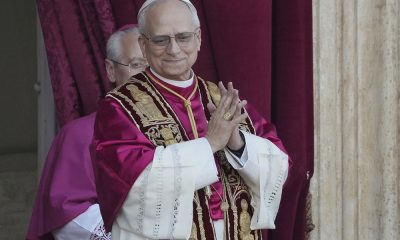OPINION
World Press Freedom Day: More Than A Ceremony, Let Nigerian Journalists Breathe!

ISAAC ASABOR
As the world prepares for another World Press Freedom Day, it is critical to look beyond speeches, hashtags, and ceremonial sloganeering. In Nigeria, where journalists walk a fine line between duty and danger, World Press Freedom Day must be felt rather than just celebrated. It must translate into actual action. If not, it devolves into an annual hypocrisy disguised as global camaraderie.
Without exaggeration, press freedom in Nigeria is under threat. This is not a poetic exaggeration, but a harsh reality. In a country where journalists are routinely harassed, arrested, intimidated, and even killed for doing their jobs, the question arises: “What exactly are we about to celebrate on Saturday, May 3, 2025?
Nigerian journalists have continued to operate in hostile territory, from the days of Decree 4 during the military era to the more subtle but brutal silencing tactics of modern civilian administrations. Despite constitutional provisions ensuring freedom of expression and the press under Section 39 of the 1999 Constitution (as amended), the Nigerian government has found ways to undermine and circumvent this right, using security agencies, draconian laws, and, in some cases, thugs sponsored by powerful individuals to silence critical voices.
In recent years, several journalists have been arrested on bogus charges. Cases involving “cyberstalking” and “defamation” have been used as legal justifications to restrict investigative journalism. The Cybercrime Act of 2015, which was intended to address internet fraud and security, has instead become a weapon against dissent. Instead of combating digital crimes, it is being used to digitally handcuff whistleblowers.
If we are honest, Nigerian journalists are not free. They are surviving. And survival does not equate to freedom.
As World Press Freedom Day is observed worldwide on May 3rd, Nigerian authorities and media stakeholders are likely to hold panel discussions and seminars and issue press statements echoing the usual calls for a free press. Government officials will deliver speeches urging journalists to be “responsible,” even as their regimes stifle responsibility through repression. If history is any guide, these commemorations frequently fail to produce any measurable results.
What Nigeria needs is not another ceremony, but a renewed commitment to ensuring journalists’ freedom in practice, not just on paper. The reasoning behind the preceding viewpoint is not difficult to understand: it is one thing to allow freedom; it is quite another to protect it. Therefore, the Nigerian government must understand that press freedom is a right, not a privilege. More than a right, it is the lifeblood of democracy.
In light of the foregoing, Nigeria must begin by revisiting the Cybercrime Act and other similar laws that have been weaponised against journalists. Any legal framework that threatens journalistic work on vague grounds such as “offensive publication” or “cyberstalking” must be repealed or amended to clearly distinguish between hate speech and fair reporting.
Again, journalists covering protests or controversial issues are frequently brutalised by security forces. Armed officers attacking journalists is unacceptable in a democratic state. The Inspector General of Police must issue standing directives to ensure the safety of journalists on the pitch.
In fact, one of the greatest threats to investigative journalism is the fear that sources’ identities will be revealed. Nigeria requires comprehensive whistleblower protection laws that ensure the confidentiality of journalistic sources.
To fully protect journalists in Nigeria and ensure their collective freedom, a media ombudsman body free of government interference should be established to handle complaints about journalists and media outlets. Instead of dragging journalists to court or unleashing the DSS on them, a professional body would be established to uphold ethical standards.
Without inciting sentiment in this context, allow this writer to reveal that the majority of Nigerian journalists work in poor conditions, with irregular pay, no insurance, and little to no institutional backing. As a result, media owners and unions must prioritise journalists’ well-being. A journalist who is poor, unprotected, and underpaid is already silenced.
Another important point to remember in this context is that criticising the government or powerful individuals is not unpatriotic. The idea that journalists who expose corruption or malfeasance are “enemies of the state” should be rejected. Journalism is not sabotage; it is a service.
In fact, public officials, particularly those with military or authoritarian backgrounds, must receive training on the role of the free press in democracy. This is because some leaders continue to treat the media as an opposition party that must be destroyed.
On the other hand, it is prudent to argue that while fighting for press freedom, journalists must uphold ethical standards. Freedom comes with responsibilities. The spread of fake news, sensationalism, and unverified reports undermines the cause of press freedom. Inaccurate reporting gives tyrannical leaders ammunition to undermine the entire profession.
Without a doubt, the press’s integrity is its most powerful defence. As a result, upholding the principles of accuracy, balance, and accountability is not only a public duty but also a deterrent to those who seek to destroy the Fourth Estate.
To conclude this piece from an international perspective, it is appropriate to argue that the international community, particularly organisations such as UNESCO, Amnesty International, and Reporters Without Borders, must go beyond compiling annual press freedom indices. Diplomatic pressure should be applied to countries such as Nigeria, where journalists are harassed. Visa bans, foreign aid conditions, and media development grants should all be linked to measurable increases in press freedom.
In 2024, Nigeria ranked 123rd out of 180 countries on the Press Freedom Index. That is a badge of shame. What will change in 2025?
In fact, celebrating World Press Freedom Day in Nigeria while journalists are imprisoned, reporters are terrified, and media outlets are raided for doing their jobs is the epitome of irony. It is like having a feast during a famine and pretending everyone is full.
Therefore, if Nigerian leaders are serious about celebrating press freedom, they must first free the press. Let us go from ceremony to substance. Let the world know that we celebrated World Press Freedom Day in Nigeria. Let the world see how we treat our journalists in the future. Only then can we claim to be part of the free world. Let Nigerian journalists breathe. Allow them to write. Let them speak. Allow them to be free, not just on May 3rd, but every day.
-
CRIME3 years ago
PSC Dismisses DCP Abba Kyari, To Be Prosecuted Over Alleged $1.1m Fraud
-
FEATURED3 years ago
2022 Will Brighten Possibility Of Osinbajo Presidency, Says TPP
-
FEATURED2 years ago
Buhari’s Ministers, CEOs Should Be Held Accountable Along With Emefiele, Says Timi Frank
-
BUSINESS & ECONOMY2 years ago
Oyedemi Reigns As 2023’s Real Estate Humanitarian Of The Year
-
SPORTS1 year ago
BREAKING: Jürgen Klopp Quits Liverpool As Manager At End Of Season
-
SPORTS2 years ago
Could Liverpool Afford Kylian Mbappe For €200 million? Wages, Transfer Fee
-
ENTERTAINMENT2 years ago
Veteran Nigerian Musician, Basil Akalonu Dies At 72
-
FEATURED2 years ago
Tribunal Judgement: Peter Obi Warns Of Vanishing Electoral Jurisprudence, Heads To Supreme Court
-
BUSINESS & ECONOMY2 years ago
Oyedemi Bags ‘Next Bulls Award’ As BusinessDay Celebrates Top 25 CEOs/ Business Leaders
-
FEATURED3 years ago
2023 Presidency: South East PDP Aspirants Unite, Demand Party Ticket For Zone



































